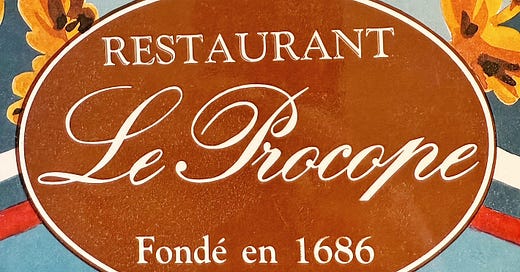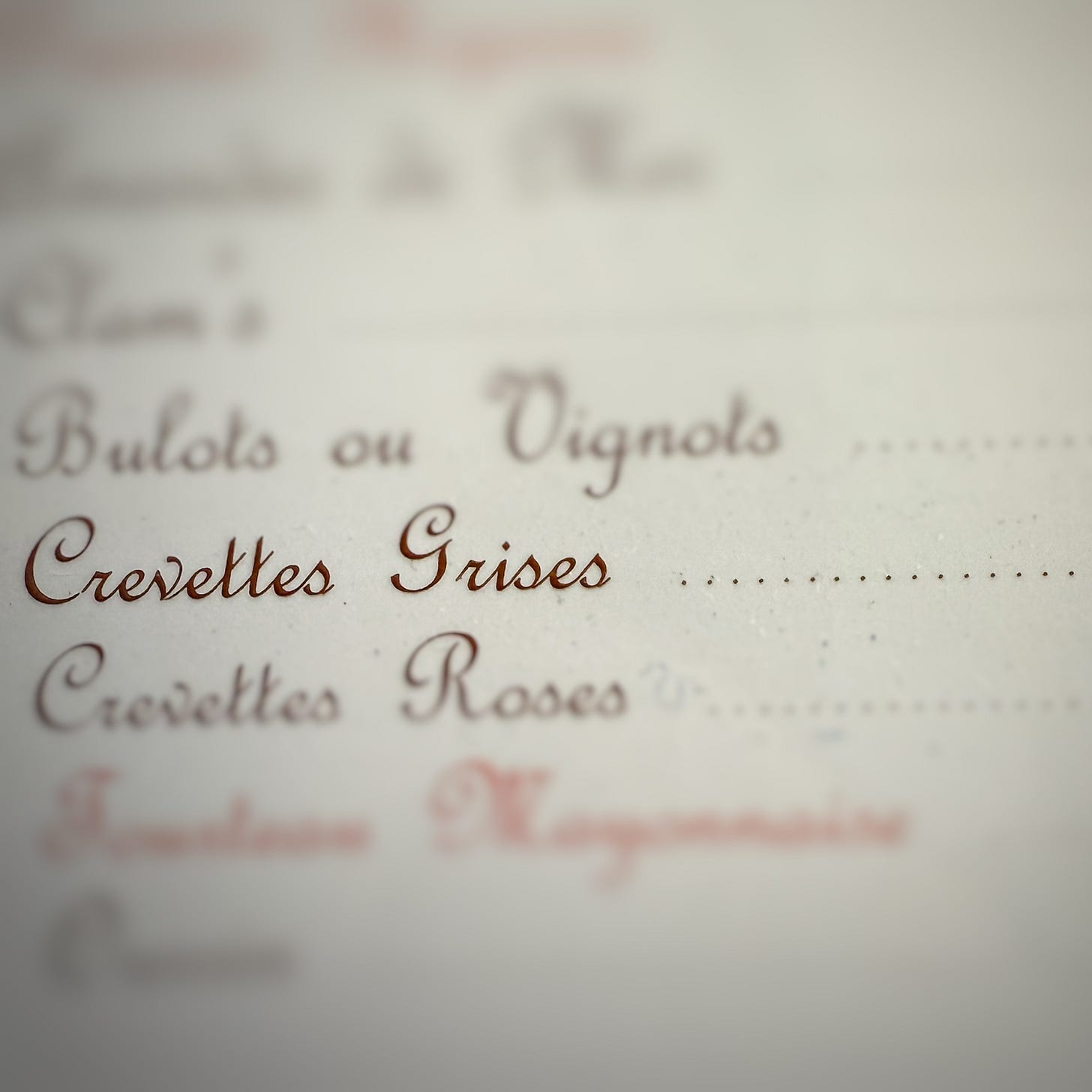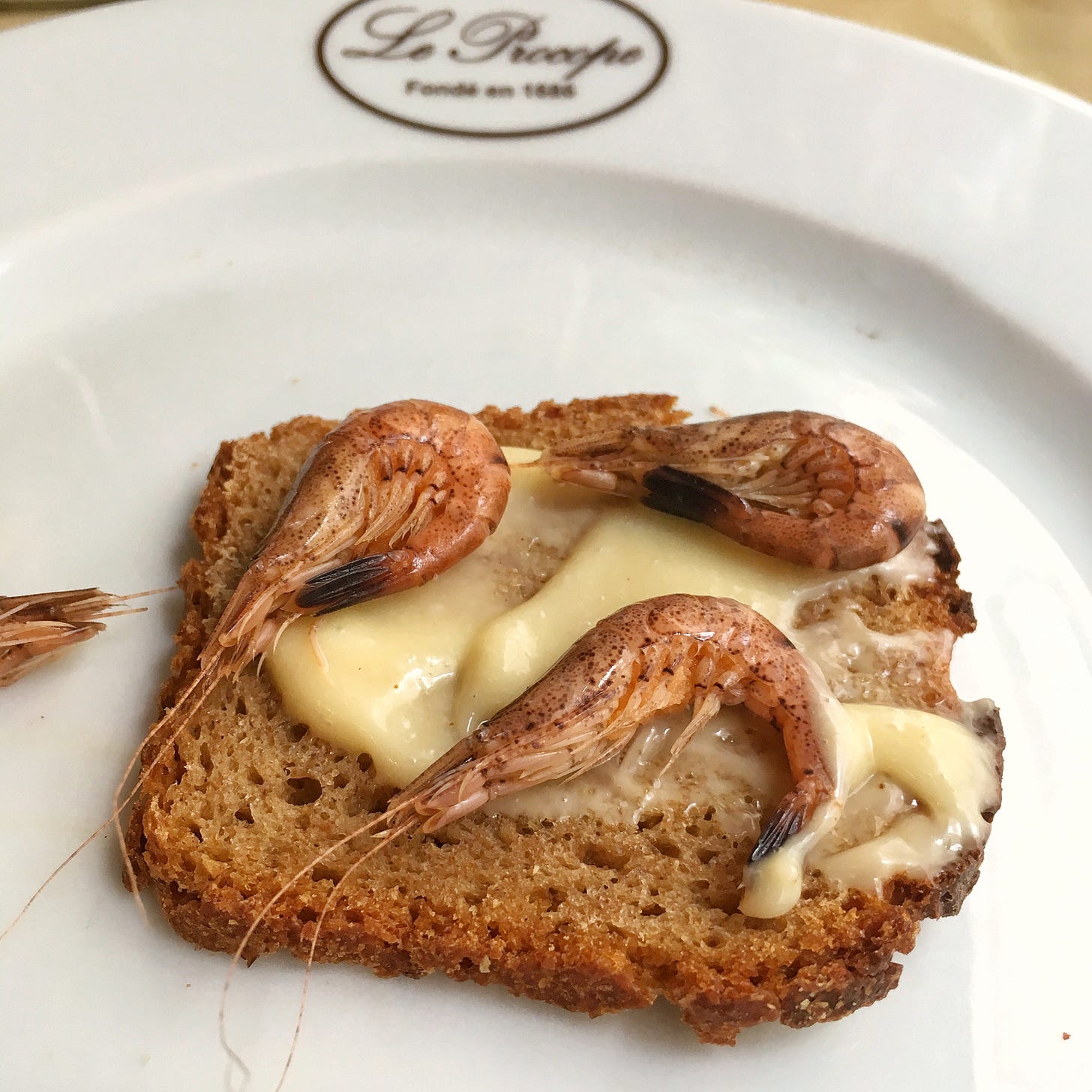I hadn’t planned to eat at Le Procope—I simply turned a corner and there it was. Running into a restaurant that had my name written all over it seemed as good an omen as I was likely to find on my first night back in Paris in nearly ten years. I was tired from traveling, so I simply surrendered myself to fate. Since it was it was late July and very warm, I asked for a table outside.
I’d been to this restaurant before, but that was thirty years and several trips to France ago. I scanned the patio. Le Procope had seen better days, but then again, so had I. I ordered a martini as soon as my backside hit the chair. The last beverage I ordered there was Coca-Cola to wash down a plateful of snails because I was a teenager and that was my idea of sophistication then.
As I waited for my drink, I saw that the terrace was filled with other people who didn’t seem to mind eating dinner at six thirty in the evening. An elderly Danish couple were fighting as I took my seat next to them. Not with each other, but with the rubbery strands of hot Gruyère that stretched from their spoons to their bowls of soupe à l’oignon. On my other side, two German girls clutched oversized rucksacks tightly between their knees. “Tourists,” I thought to myself with an unearned sense of superiority. This was my sixth trip to Paris. I had no time for sightseeing or postcard purchasing—I had friends to lunch with and boulevards to stroll.
I noticed that I was the only solitary diner, and as I realized this would be the first meal I’d ever eaten alone in Paris, my waiter materialized before I could get too depressed about it.
“Et pour commencer, monsieur?” he asked as he placed the martini in front of me. He shoved the menu into my drinking hand, which gave the question an unwanted urgency. His voice, resonating and vaguely sinister, reminded me of Paul Frees as the disembodied host of Disney’s Haunted Mansion, so I thought it best to not make him mad. I ordered the onglet de bœuf and a half bottle of Médoc, and handed the menu back. He did not accept.
“Et pour commencer, monsieur?” he repeated strenuously. Ah, yes. He’s asking how I want to begin my meal—before the steak. I was hot and jet lagged and not terribly hungry but there was such an absurd urgency in his voice, I felt pressured to order a starter. Quickly. Shellfish sounded refreshing. I eyed the assiette d’huîtres, but worried about eating oysters in months without an “r” in the name, and wasn’t willing to throw caution to the wind on such a hot evening, thousands of miles from my own, familiar toilet bowl. The waiter stood over me, staring and waiting for me to make a decision, so I ordered the next thing I saw listed in the Les Fruits de Mer section of the menu—the crevettes grises. The man’s left eyebrow lifted slightly, as did the corner of his tightly pursed mouth. He quickly turned heel, taking both the menu and his person away. Had I pleased him? He had been in my life for no more than ten minutes and I was already desperate for his approval.
Alone with my cocktail, I took a long, slow sip and began to relax. It tasted of cold gin, which was a relief. It had taken me years (my fifth trip, precisely) to figure out how to order a martini in France. My first attempt (third trip) at dingy train station bar in Normandy resulted in a warm glass of Martini & Rossi dry vermouth. My second try got me the same thing, but over ice. It was only when I managed to combine the French words for “gin”, “dry”, and “cold” to the order that the definite article finally arrived.
Ordering a martini in France is very un-French, which suits me just fine, because I will never be mistaken for a local there. On the contrary, I view it as a way of embracing the fact that I am unmistakably American—hopefully, one who is polite, not too loud, ruins his palate with strong spirits before meals, and makes the effort of speaking the language, however poorly. Having a martini in my hand means I can hold onto something comfortable and familiar as I adjust to the foreign and unfamiliar.
I took a long sip and thought about my last dinner in France—a night I found myself both besotted by my dining companion and bloated from the fondue I’d made the mistake of ordering. Eight years later and several pounds heavier, I found myself back in Paris and alone, and I was fine with that. I was only in town for two days and on my way south to read a poem at a friend’s wedding near Bordeaux. I could never resist a chance to perform, not unlike the original patrons of Le Procope.
Considered the oldest restaurant in Paris, Le Procope opened its doors in 1686 and has had more than its fair share of celebrity patrons over the centuries. It was so popular with the actors and writers of the Comédie Française that they built their first theatre across the street on what is now called the Rue de l’Ancienne Comédie. Voltaire drank endless amounts of coffee mixed with chocolate there. Napoléon once left his hat because he couldn’t cover his bill. Benjamin Franklin worked on the U.S. Constitution upstairs. It is even rumored that Marie-Antoinette’s death warrant was signed at one of its tables.
Le Procope is no longer revolutionary. The restaurant had come to resemble an old man living out the remainder of his years surrounded by mementos of more glorious times. There was a certain sweet sadness to it, which I found relatable. I sat back in my chair, fingering my cocktail glass, and began to relax when I had a sudden, worrying thought:
“Did I just order fucking grey shrimp?”
And then, as if on cue, my waiter materialized to arrange a large open space on my little table top. Another gentleman followed with a large metal tower—the type typically used to set hot pizzas at nose-level to diners at family-friendly eating establishments back in America. The final flourish was an aluminum platter populated with dead sea creatures, which my waiter set gently atop the tower, giving it a slight turn so that a particularly long pair of antennae pointed perilously close to my eyeballs. It was a lot of fuss for the two dozen or so shrimp—each roughly the size of my thumb. Accompanying these dainty pinkish corpses were a plate of sliced brown bread, a small bowl of aïoli, and a butter knife. They were not grey as advertised, thankfully, but they were still firmly encased in their shells. Was I supposed to eat them whole? They were far too little to peel. Emily Post had not prepared me for this moment. Too self-conscious to reach out to the waiter for advice, I instead reached for something safe and familiar—my martini.
The fuss made at my table and the towering seafood erection now resting upon it piqued the interest of my neighbors. The Danes called a temporary truce with their soups to stare. One of the German girls swiveled around so violently to look that I feared for her spine. My waiter leaned against a wall at the edge of the patio, folded his arms, and waited for the show to begin. If I had been shoved naked onto a stage with a follow spot and my mother shout-whispering, “Dance for me, baby” from the wings it would not be as humiliating to me as being faced with a platter of food I did not know how to eat in front of a judgmental French waiter whose approval I unaccountably craved.
I took a long sip from my cocktail glass to summon a bit of courage and decided to do what I often did when faced with a situation I didn’t think I could handle—pretend to be somebody else who could. I reminded myself that I was dining in the ghostly shadow of the original Comédie Française and I had an audience, whether I wanted on or not, so I might as well put on a show.
I picked up my butter knife and brandished it like Zorro, smearing a generous amount of garlicky aïoli over a slice of bread like a letter “z”. Next, I piled a prodigal amount of shrimp on top, and took a bite large enough to suggest that I was a person who loved both life and crevettes grises. A chunk of shell attached itself to the back of my throat, which triggered a coughing fit, and all I could think was “Oh fuck, this is how Molière died.”
The noise from the chewing, as I worked my way through bits of antenna and carapace was loud enough to reminded me of the ortolan scene in Gigi, in which the title character visits her great aunt Alicia to learn how to eat ortolan—little songbirds who were once blinded, force fed, drowned in Armagnac, roasted, and eaten whole by the wealthy and sadistic.
“The bones don’t matter,” the sophisticated aunt tells Gigi, as she crunches her way through a delicate ribcage. I adopted this as my mantra as I continued to chew, making an abrupt code switch from the gusto of a dashing Mexican outlaw to the detached coolness of an elderly French courtesan. Aunt Alicia is a woman who lives happily in her past, surrounded by souvenirs of more dazzling times. The same could be said of Le Procope.
Approaching my second slice of bread with more caution, I spread it with a far less extravagent amount aïoli, and reduced the amount of crevettes in the name of choke prevention. I didn’t actually want a second helping, but I worried that stopping at one was a sign of weakness. To help things along, I imagined my incisors as enameled guillotines beheading a few of the former habitués of Le Procope. So long, Danton. Farewell, Robespierre. I spared the last shrimp, which I named after Madame Tussaud, because she managed to escape beheading. But only just.
By the time I finished decapitating my shrimp, I’d lost most of my audience. The German girls with their giant rucksacks had disappeared, and my waiter seemed to have lost interest as soon as he determined I wasn’t going to choke to death. So I lifted my glass to the Danes, who were still staring at me, and toasted them with the last sip of martini.
The onglet de bœuf and Médoc were consumed without further drama, as was my coffee, armagnac, and “Profiteroles Procope”.
Everyone but the waiter was gone when I paid the bill. I left him an embarrassingly large tip because I still wanted him to like me, even though I would probably never see him again. Lightly buzzed and overfed in my tightening summer-white shirt, I thought I like a middle aged Pillsbury Doughboy, so I poked myself gently in the belly and let out a quiet giggle that I hoped only I could hear. When I stood up to leave, my waiter with the sinister voice smiled, shook my hand, and thanked me in English. It may have been due to the tip I gave him, but I prefer to think of his gesture as a form of applause.
As I walked down the cobblestone passage behind the restaurant, Paul Frees popped back into my head again because I remembered that, not only was he the voice of the “Ghost Host” in the Haunted Mansion at Disneyland, he was a the voice of the Pillsbury Doughboy. That man’s voice was everywhere.
I’d stumbled across Le Procope by accident and waddled away oddly satisfied. Not because of the food, but rather in spite of it. I assumed that dinner at a restaurant I’d been to before in a city I felt comfortably familiar with would offer few surprises. Instead, I found myself at the center of a poorly written comedy centered around boiled arthropods. It wasn’t especially funny—more like mildly amusing, really—but the Danes seemed to like it and that was good enough for me.
Walking along the Boulevard Saint-Germain heading back to my hotel, I discovered something wedged between my molars as I was passing the Sorbonne. I looked around—no audience in sight. I picked it out with a quick flick of a fingernail. It was a bit of grey shrimp shell.
“My first souvenir,” I thought.
I decided not to save it.







I think having the oldest restaurant in Paris named after you is exceptionally cool – and very clever of you to arrange. But in the interests of humanity, I think word-by-word instructions on the Martini question are called for.
But how is one supposed to eat those gray shrimps? Did you find out whether you consumed them correctly? Regardless, always appreciate that specific ortolan nod.